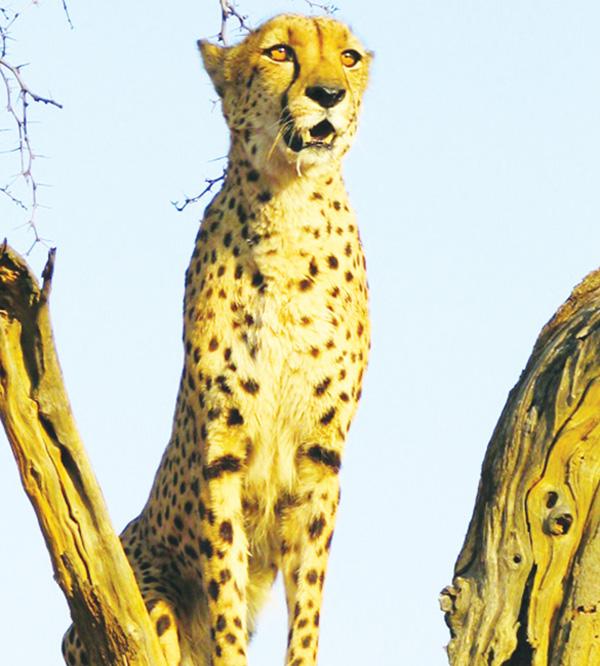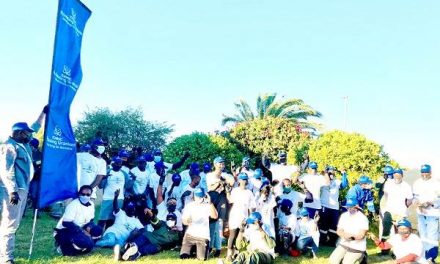
Cheetah genetic pool continues to decline: Cheetah Conservation Fund partners with Smithsonian researchers in new study on the decline of genetic diversity in wild cheetahs

OTJIWARONGO, Dr Laurie Marker, Founder and Executive Director of the Cheetah Conservation Fund (CCF), and Dr Stephen J. O’Brien, a long-time CCF research collaborator, former CCF Board Chairman and currently director of the Dobzhansky Center for Genome Bioinformatics at St. Petersburg State University in Russia, contributed a part of the research for a newly published study from the Smithsonian Conservation Biology Institute (SCBI).
“Continued decline in genetic diversity among wild cheetahs (Acinonyx jubatus) without further loss of semen quality”, published on 21 June in Biological Conservation, looked at the DNA of more than 100 male cheetahs in Namibia over the past 30 years to determine how modern population declines have impacted the species genetic health. The study revealed the planet’s last stronghold of wild cheetahs is losing genetic diversity at an alarming rate. It also found, surprisingly, that wild and captive cheetahs have equally poor sperm quality, with only about 1 in 10 having what researchers consider to be ‘normal’ sperm quality.
“It’s scary to chart a three-decade decline like this within the last large remaining wild cheetah population”, said Dr Marker. “This means each and every remaining animal has the ability to impact species survival. It is imperative we maintain a healthy wild population of cheetahs in Namibia and elsewhere and capture genes of male cheetahs with good sperm, to introduce them and other beneficial traits to managed, captive populations. This underscores the need for CCF’s conservation programmes and makes our efforts to freeze and bank sperm in CCF’s Genome Resource Bank more crucial than ever”.
Well-known CCF ambassador cheetah, Chewbaaka provided genetic samples used in the study.
CCF has a long history of partnering with SCBI on projects concerning the cheetah. SCBI researchers Dr. Adrienne Crosier and Dr. Pierre Comizzoli have played significant roles in cheetah reproductive research.
Along with Dr Marker, Dr. Crosier developed the methods used to viably freeze and thaw cheetah sperm, and most notably, in 2007, together with Dr. Comizzoli they produced the first in vitro cheetah embryo to survive to the blastocyst stage at CCF’s Applied Biosystems Conservation Genetics Laboratory at the CCF conservation and research facility near Otjiwarongo.
SCBI researchers also utilise CCF’s collection of biological samples in their work with captive cheetah populations in the United States. At SCBI’s headquarters in Front Royal, Virginia, SCBI maintains a cheetah breeding centre established to support a genetically diverse and self-sustaining population under human care. Since opening in 2007, 25 surviving cubs have been born.
The lead author of the SCBI study is Dr Kim Terrell, former SCBI doctoral student and current director of research and conservation at the Memphis Zoo. Additional authors on the paper are Drs Adrienne Crosier, David Wildt and Warren Johnson at SCBI and Nicola Anthony at the University of New Orleans. Drs Wildt and Crosier also serve as scientific advisors to CCF, and Dr Crosier is the manager of the Cheetah Species Survival Plan (SSP) administered by the Association of Zoos and Aquariums, a plan Dr Marker helped develop in the mid-1980s.“Genetic health is essential for species survival”, said Dr Wildt. “This is yet another example for the need to protect habitat as more range allows cheetahs to distribute their most valuable genes to sustain a healthy population”.
“Cheetahs have already come back from the brink of extinction once in history. We don’t know if they can do it a second time. It is crucial that wildlife institutions continue to invest in methods to complement conservation efforts in the wild”, added Dr Terrell.
On 18 October 2016, Dr Marker and a member of the SCBI team will present a joint lecture in Washington, D.C, “Challenges in Cheetah Conservation,” to discuss their ongoing research partnership and the problems threatening cheetah populations, including human-wildlife conflict, habitat loss and poor genetic health.












































